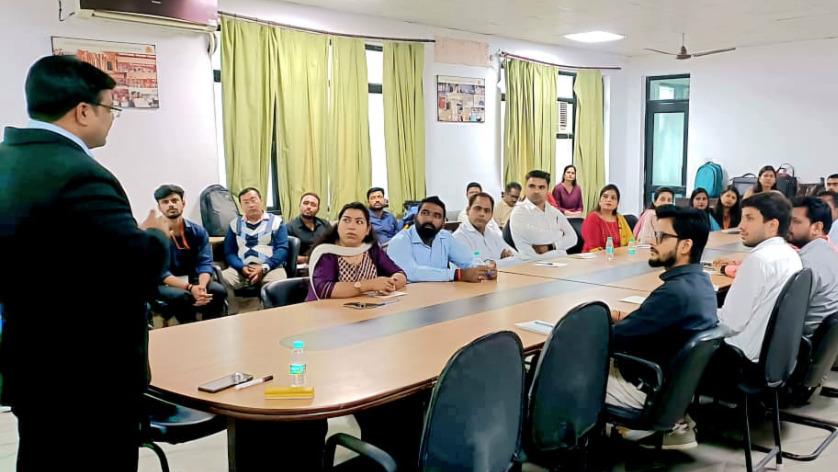Staff Development Program on Effective Communication and Active Listening
On November 9, 2024, Teerthanker Mahaveer University (TMU) hosted a Staff Development Program (SDP) focused on ‘Effective Communication and Active Listening.’ Organized by the Center for Teaching, Learning, and Development (CTLD), the event aimed to enhance professional communication skills and foster a collaborative workplace culture. The two-hour session brought together university staff for an engaging and insightful experience, leaving a lasting impact on their daily professional interactions.
Event Overview
The program was conducted from 4:00 PM to 6:00 PM in the Committee Room of the Engineering Building. It was exclusively designed for university staff, with Prof. (Dr.) Pankaj Kumar Singh, Director of CTLD, leading the session.
Objectives of the Program
The primary aim of the SDP was to improve participants’ communication and active listening skills, equipping them to:
- Communicate clearly and confidently.
- Foster better collaboration with colleagues and students.
- Enhance their professional effectiveness.
Key Focus Areas
Active Listening Techniques
Active listening was emphasized as a tool to improve understanding, empathy, and engagement in professional interactions.
Overcoming Communication Barriers
The session addressed common communication hurdles, providing actionable solutions to navigate them effectively.
Role of CTLD in Staff Development
The workshop was part of CTLD’s ongoing efforts to support the professional growth of TMU staff. By organising tailored programs, CTLD ensures that staff members stay ahead in their respective roles, fostering a supportive and efficient work environment.
Opening Address by Prof. (Dr.) Pankaj Kumar Singh
In his opening remarks, Prof. Singh stressed the importance of effective communication and active listening in professional settings. He elaborated on how these skills enhance collaboration, problem-solving, and workplace harmony, stating, "Effective communication is not just about speaking—it’s about understanding and being understood."
Activities and Methods Used
Group Activities and Discussions
Interactive group activities allowed participants to practice active listening and receive feedback on their communication styles.
Reflective Exercises and Practical Tips
Exercises were conducted to help attendees identify and address their communication gaps, making the learning process practical and relatable.
Real-World Applications
Participants were encouraged to apply the techniques in real-world workplace scenarios. For example, strategies for resolving conflicts and conducting productive meetings were discussed, ensuring immediate usability of the skills learned.
Overcoming Communication Barriers
Prof. Singh highlighted common challenges like misinterpretation and lack of clarity. He shared valuable tips, including:
- Using clear and concise language.
- Being mindful of non-verbal cues.
- Practicing empathy to understand others' perspectives.
Impact on Workplace Culture
The workshop underscored the importance of teamwork, respect, and effective communication in fostering a positive workplace culture. By equipping staff with these skills, CTLD reaffirmed its commitment to creating a supportive and productive work environment.
Conclusion
The Staff Development Program on ‘Effective Communication and Active Listening’ was a resounding success, leaving participants equipped with essential skills for professional excellence. CTLD’s initiative not only enhanced individual capabilities but also contributed to a stronger, more collaborative workplace culture at TMU.
FAQs
Q1: What is the Staff Development Programme?
Ans: The Staff Development Programme was an event held at TMU, aimed to enhance professional communication skills and foster a collaborative workplace culture.
Q2: Who led the session Staff Development Programme?
Ans: Prof. (Dr.) Pankaj Kumar Singh, Director of CTLD, led the session.
Q3: What activities were conducted during the Staff Development Programme?
Ans: The program included group activities, reflective exercises, and discussions to practice communication and listening skills.
Q4: How did participants benefit from the workshop?
Ans: Attendees gained practical insights to improve workplace communication, enhancing teamwork and efficiency.











